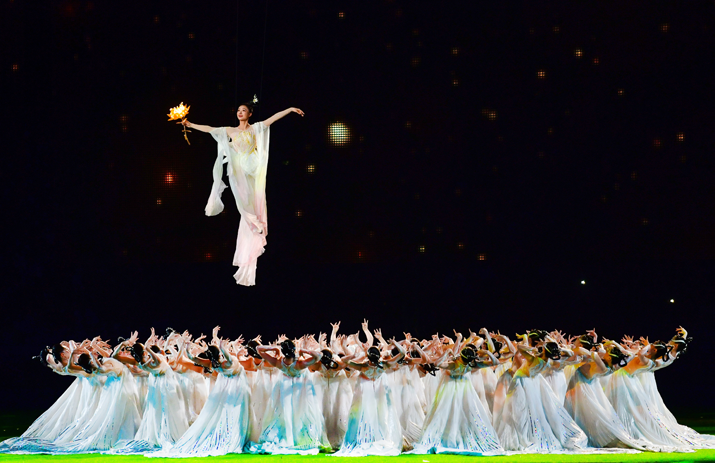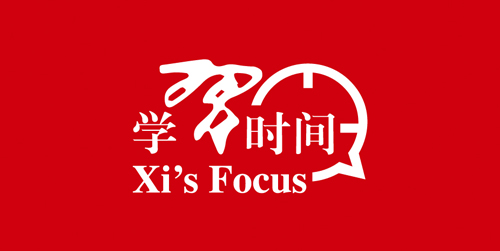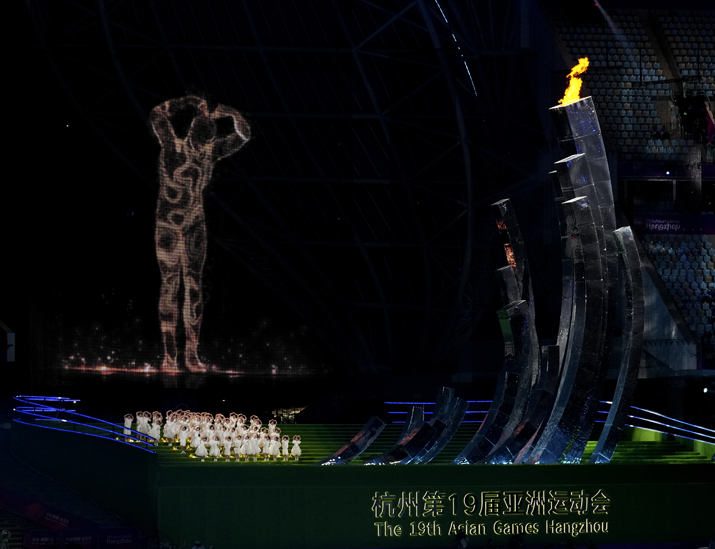Traditional Chinese culture featured prominently in the Games' opening ceremony on September 23 and the closing ceremony on October 8. While the ceremonies highlighted the solar terms, which were added to UNESCO's Intangible Cultural Heritage of Humanity list in 2016, the he-he (he-he means hexie—harmony and hezuo—cooperation) culture was a common thread that ran through them.
Cultural icons
Cold Dew is the time when lotus flowers wither and osmanthus flowers begin to bloom in the Games' host city of Hangzhou, Zhejiang Province in east China. The closing ceremony took inspiration from this transition. In a dance themed on the coexistence of the lotus and the osmanthus, the former symbolized the struggles of the athletes and the latter represented their achievements and glory.
The final performance at the closing ceremony, titled Flower of Memories, encapsulated the significance of he-he culture to Chinese people. This performance was themed on the lotus flower (hehua), with the word for lotus also pronounced he in Chinese. "We chose the lotus flower as the theme with the purpose of showcasing the beauty of the he-he concept. The design of the flower used in the performance was based on a study of more than 1,000 features of lotus flowers," said Sha Xiaolan, chief director of 2022 Asian Games opening and closing ceremonies.
According to Zhang Liwen, a professor at Renmin University of China who studies Chinese philosophy, the origins of he-he culture date back to the Spring and Autumn Period (770-476 B.C.). The two hes in this term are each written with a different character. The first means peace, harmony and auspiciousness, while the second means integration, incorporation and cooperation. Combined, they form a much celebrated cultural concept in China.
Eminent ancient philosopher Confucius deemed harmony to be the golden rule for governance, the etiquette system, and interpersonal relations, while Laozi, founder of Taoism, interpreted it as the product of the interaction between yin and yang, the two opposite forces in the universe and the foundation of the existence of every living being. Confucianism and Taoism are two of the most important schools of thought that have shaped Chinese culture.
The opening ceremony was riveting in that it bridged traditional Chinese culture with modern Chinese design and technology, using a digital torchbearer and an augmented reality interactive session. During the opening ceremony, a digitally animated figure traversed the iconic Qiantang River that flows through Hangzhou, before lighting the wave-shaped cauldron alongside Chinese Olympic swimming champion Wang Shun, which symbolized the he-he coexistence between humanity and nature.

Dancers perform at the closing ceremony of 19th Asian Games in Hangzhou, Zhejiang Province, On October 8 (CNSPHOTO)
Shared values
Kong Xianglong, a research assistant with the Beijing-based Academy of Contemporary China and World Studies who worked in Hangzhou on an Asian Games research program and watched the ceremonies, expressed his admiration of the show as well as the Asian Games volunteers, who he said were walking examples of he-he culture.
"The dance performances were absolutely gorgeous, a perfect distillation of the he-he idea and a highlight of the Asian Games," Kong told Beijing Review. "But what impressed me most were the volunteers."
Hangzhou Asian Games volunteers were known as qinghe volunteers. The name means green lotus, but sounds very similar to the word qinhe, which means affinity. "They really were filled with affinity," Kong said. "The considerate service they provided every day actually invited people to learn about he-he culture."
"I previously had no connection to Hangzhou, but now, after the closing ceremony, I think I share a special bond with this city," said Wan Li, a 22-year-old college student at Fujian Normal University. "Watching the ceremony was also a wonderful chance for me to learn about he-he culture, in which I was uninterested before."
"I'm so glad the closing ceremony embraced the 24 solar terms. I learned the 24 solar terms song from my grandparents at an early age. So did my parents," said Zhang Ran, a 26-year-old clerk at intellectual property law firm Liu Shen & Associates in Beijing. "Solar terms are also a popular concept among young people. Many young netizens eagerly anticipate their first cup of milk tea in the fall, and the 'fall' they are referring to is Autumn Equinox. I think this is a good demonstration of the significance of solar terms for young people."
Each of the 24 solar terms coincides with events in the natural world. The terms were devised more than 2,000 years ago to guide not only agricultural activities, but also customs concerning food, dressing and social life. Nowadays, although Chinese people refer to more modern systems in daily life, except for in the agricultural area, they maintain a strong emotional and cultural bond with the solar terms as reminders of the wisdom, creativity and diligence of their ancestors.
Pakistani cricketer Muhammad Tayyab Iqbal said he believes that the opening and closing ceremonies played an important role in bringing people from different countries together. "I saw a lot of different countries' athletes coming together, sharing their cultures and performing. I see a huge success," he told Xinhua News Agency.















